Markers¶
Markers are used to denote frames at which something significant happens, e.g. it could be that a character’s animation starts, the camera changes position, or a door opens. Markers can be given names to make them more meaningful at a quick glance. They are available in many of Blender’s editors.
Note
Unlike keyframes, markers are always placed at a whole frame number, you cannot set a marker at frame 2.5.
Markers can be created and edited in the following editors:
Note
A marker created in one of these editors will also appear in all others that support them.
Types¶
Next to the standard markers Pose markers are another type of markers, which are specific to armatures and shape keys. They are used to denote poses in the Action Editor mode and Shape Keys Editor of Dope Sheet.
Visualization¶
Standard¶
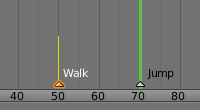
Markers: small but useful.
Most of the editors visualize markers the same way: as small triangles at their bottom, white if unselected or yellow if selected.
If they have a name, this is shown to their right, in white when the marker is selected.
Sequencer¶
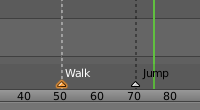
Markers in the Sequencer.
The Video Sequence Editor just adds a vertical dashed line to each marker (gray if the marker is unselected, or white if it is selected).
3D View¶
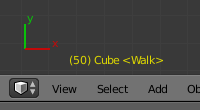
Marker in a 3D View.
The 3D View does not allow you to create, edit, and remove markers, it just show their name in the Object Info in the bottom left corner, when on their frame (see Marker in a 3D View).
Pose Markers¶
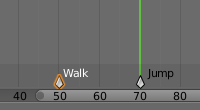
Pose markers in the Action Editor.
Pose markers show a diamond-shaped icon in the Dope Sheet. In the NLA editor the pose markers are shown as a red dashed line.
Add Marker¶
Reference
M or Ctrl-Alt-M in the VSE EditorThe simplest way to add a marker is to move to the frame where you would like it to appear,
and press M.
Hint
Markers can also be added while playback.
Pose Markers¶
If Show Pose Markers is checked a pose marker and a new pose in the Pose Library are added.
Selecting¶
Reference
RMBClick RMB on the marker’s triangle to select it.
Use Shift-RMB to select multiple markers.
In the Graph Editor, Dope Sheet, NLA Editor, and Video Sequence Editor,
you can also select all markers with Ctrl-A, and border-select them with Ctrl-B
(as usual, LMB to select, RMB to deselect).
The corresponding options are found in the Select menu of these editors.
In the Timeline, you can select all markers with A, and border select with B.
Editing¶
Duplicate Marker¶
Reference
Shift-DYou can duplicate the selected markers by pressing Shift-D. Once duplicated,
the new ones are automatically placed in grab mode, so you can move them to the desired location.
Note
Note that unlike most other duplications in Blender,
the names of the duplicated markers are not altered at all
(no .001 numeric counter append).
Deleting Markers¶
Reference
XTo delete the selected markers simply press X,
and confirm the pop-up message with LMB.
Rename Marker¶
Reference
Ctrl-MHaving dozens of markers scattered throughout your scene’s time will not help you much unless you
know what they stand for. You can name a marker by selecting it, pressing Ctrl-M,
typing the name, and pressing the OK button.
Grab/Move Marker¶
Reference
GOnce you have one or more markers selected, press G,
while hovering with the mouse over the marker bar,
to move them, and confirm the move with LMB or Return
(as usual, cancel the move with RMB, or Esc).
Or drag them with the RMB.
By default, you grab the markers in one-frame steps, but if you hold Ctrl,
the markers will move in steps corresponding to one second (according to the scenes FPS).
Show Pose Markers¶
Reference
Only Pose markers are shown and editable in Action editor or Shape Keys editor by enabling the checkbox.
Make Markers Local¶
Reference
It is possible to convert standard markers into Pose markers with . Note that the original marker will be gone. If you want to keep it, make a duplicate before you convert.
Jump to Next/Previous Marker¶
Reference
Moves the Time Cursor to the next/previous marker relative to the current Time Cursor position.
Bind Camera to Marker¶
Reference
Ctrl-BSwitching cameras can be done with the Timeline operator Bind Camera to Markers by having both the camera and marker selected.
The triangle above the camera will become shaded when active.
Workflow¶
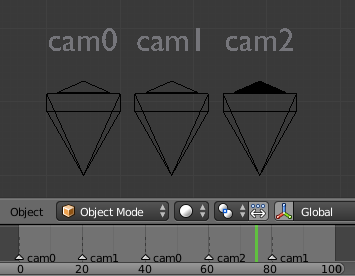
First in the Timeline, add a set of markers used to switch cameras.
Press M to add marker, then Ctrl-M to rename,
duplicated markers should retain the same name.
- In the 3D View, select the Camera the Markers will switch to.
- In the Timeline, select the Marker(s) to switch to the Camera.
- In the Timeline, press
Ctrl-Bto Bind Cameras to Markers.